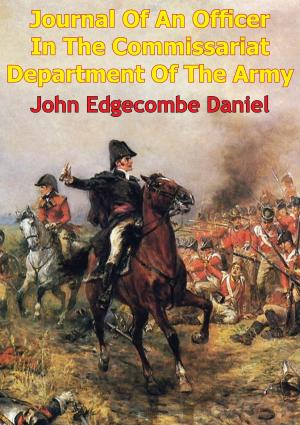Life and Correspondence of Field Marshal Sir John Burgoyne, Bart. — Vol. I
Nonfiction, History, Spain & Portugal, France, Military| Author: | Field Marshal Sir John Burgoyne, Bart. | ISBN: | 9781908902337 |
| Publisher: | Wagram Press | Publication: | May 1, 2012 |
| Imprint: | Wagram Press | Language: | English |
| Author: | Field Marshal Sir John Burgoyne, Bart. |
| ISBN: | 9781908902337 |
| Publisher: | Wagram Press |
| Publication: | May 1, 2012 |
| Imprint: | Wagram Press |
| Language: | English |
In this first volume the text focuses on the letters and journal entries of his experiences during the Peninsular War. As one of the few engineers with the Duke’s army, he was given important assignments during the sieges that dominated the movements of the Allied forces; his notes are all the more important for their commentary of the siege operations such as Badajoz and Ciudad Rodrigo that were undertaken from his expert knowledge. Notwithstanding the high casualty rates amongst the Engineers, Sir John survived the War to be employed on the disastrous expedition to New Orleans in 1814.
His post-Napoleonic career was stunted by lack of potential advancement, so much so that he became involved in civil engineering and work on fortifications. He was posted to Ireland where he endeavoured to improve the conditions of the poor, particularly straining all his influence during the disastrous potato famine. Whilst doing this he was also a frequent correspondent with the military establishment over improvements and clashed with the indifference of politicians and their budgets. The first volume ends with the beginnings of the tension with Russia and his coming employment in the Crimea.
In this first volume the text focuses on the letters and journal entries of his experiences during the Peninsular War. As one of the few engineers with the Duke’s army, he was given important assignments during the sieges that dominated the movements of the Allied forces; his notes are all the more important for their commentary of the siege operations such as Badajoz and Ciudad Rodrigo that were undertaken from his expert knowledge. Notwithstanding the high casualty rates amongst the Engineers, Sir John survived the War to be employed on the disastrous expedition to New Orleans in 1814.
His post-Napoleonic career was stunted by lack of potential advancement, so much so that he became involved in civil engineering and work on fortifications. He was posted to Ireland where he endeavoured to improve the conditions of the poor, particularly straining all his influence during the disastrous potato famine. Whilst doing this he was also a frequent correspondent with the military establishment over improvements and clashed with the indifference of politicians and their budgets. The first volume ends with the beginnings of the tension with Russia and his coming employment in the Crimea.




![Cover of the book Nelson And His Captains: Sketches Of Famous Seamen [Illustrated Edition] by Field Marshal Sir John Burgoyne, Bart.](https://www.kuoky.com/images/2015/november/300x300/9781786253736-0YSn_300x.jpg)









![Cover of the book The Political and Military History of the Campaign of Waterloo [Illustrated Edition] by Field Marshal Sir John Burgoyne, Bart.](https://www.kuoky.com/images/2012/may/300x300/9781908902535-h8nt_300x.jpg)
![Cover of the book 1815 — Waterloo [Illustrated Edition] by Field Marshal Sir John Burgoyne, Bart.](https://www.kuoky.com/images/2012/may/300x300/9781908902528-pih8_300x.jpg)